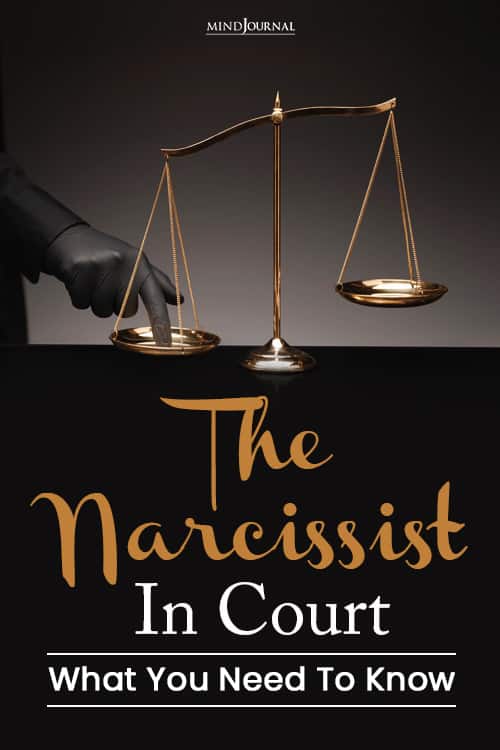Court proceedings are always messy affairs and it becomes more difficult when you are dealing with narcissists as these “high-conflict personalities” are highly skilled at masking their cruel behavior and can be very convincing to get the ball in their court.
If you find yourself in a court case against a narcissist, be prepared for the battle of your life. The narcissist wants to win, by any underhanded means available. Remember that these people are pathological liars and can put on an Oscar-winning performance in the courtroom.
The narcissist will be one of the most venomous, dangerous opponents one can face in any court of law.
The types of cases you may find yourself involved in are:
- Criminal proceedings where you are the victim of a crime committed by the narcissist.
- Divorce proceedings, where property/money are in issue.
- Custody cases involving children.
- Proceedings involving the return of property/money owed.
If the case is one of divorce, the narcissist will present himself or herself as confident and calm, whereas the downtrodden ex-partner will have been run into the ground by this ruthless individual in the months and years leading up to the court case, and often will come across as stressed and lacking confidence.
Do not engage in conversation and avoid any eye contact with the narcissist in or outside the court. If there is somewhere private to sit outside the court, find it so that the narcissist and any of their enablers are not able to intimidate or unnerve you.
Many people facing a narcissist in court worry that the narcissist will manipulate the court and their lies will be believed. It is vital to ensure that your chosen legal representative is up to speed on NPD. A lawyer who is not known is likely to be manipulated by the narcissist and may advise you to settle when it is not in your best interests to do so.

The narcissist has pushed you to your limits in the past. Now it’s your turn.
Narcissists are likely to react with fury when caught out on their lies and bad behavior and reveal information which they had no intention of revealing. Their rage may become uncontrollable, with their lawyer doing all in their power to keep them cool, calm, and collected (a rather difficult if not impossible task).
Read How The Narcissist Evades When Questioned: 8 Tactics
The narcissist is likely to have hidden or diverted assets. It is possible to break a narcissist in court, but one needs to be well prepared. It is critical that you are armed with irrefutable, undeniable, and corroborated evidence.
Avoid giving the narcissist any credible alternative scenarios to the facts. A well-versed lawyer can pose questions to the narcissist in such a way that will take the wind out of their sails ever so subtly.
‘I am led to believe you are quite knowledgeable. Sorry, what is your highest academic qualification? …So, you have no formal qualifications, you never studied for a degree?’
Contradicting or belittling the narcissist’s inflated view of themselves will shatter their fragile self-esteem.
Whilst in the confines of the courtroom, position yourself away from the narcissist and never look in their direction. The fact that you are not looking at them will likely cause a narcissistic wound. The narcissist hates to be ignored.
As we know, the narcissist believes they are above the law and not subject to the limitations of the everyday citizen. As far as they are concerned, they outrank anyone in the courtroom including the judge or magistrate. How dare anyone have the audacity to make them accountable for their actions! Anyone who gives evidence against them will be labeled a liar and corrupt.
Read Inside the Mind of a Narcissist: How A Narcissist Thinks
Never show any reaction to their words or behavior. They knew how to push your buttons before and they will try it again. Make sure that these attempts are met with indifference.
It can be difficult to relay to the court just how unacceptable the narcissist’s behavior can be. Hopefully, they will supply that information to the court and discredit themselves when their fury erupts in the courtroom.
Always tell the truth. Never be tempted to embellish the truth or paint a false picture. Don’t stoop to the narcissist’s level.
Written by Anne McCrea
Originally appeared in Narcissistic and Emotional Abuse
Narcissistic and Emotional Abuse, Shattering the Illusion, now available on Amazon
Amazon UK
Amazon US












Leave a Reply